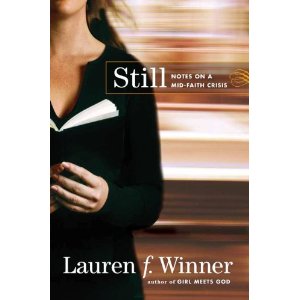 Months ago I received a review copy of Still, the “new” book by Lauren f. Winner. Sadly, seminary, fatherhood, and general laziness kept me from reading it and writing a review. Now, at the start of my internship, while trying to avoid finishing a sermon and in the need to clean things off my desk, I finally have the motivation to get this off write one.
Months ago I received a review copy of Still, the “new” book by Lauren f. Winner. Sadly, seminary, fatherhood, and general laziness kept me from reading it and writing a review. Now, at the start of my internship, while trying to avoid finishing a sermon and in the need to clean things off my desk, I finally have the motivation to get this off write one.
This book is very good. In it, I found a description of what it means to live with faith. Over the years, as I’ve traveled down the path to ordination, it seems that I’m confronted a lot of times with my journey to faith rather than my journey with faith. I’ve written the journey to faith in essay form a million times but it only seems that my journey with faith isn’t really asked for all that much. Instead, I seem to share it here on my blog. Winner writes well, and with passion, about what it means to be at the place where faith and real life interact, meet, and pound into each other. And I’ve always enjoyed this genre of writing. It is a brilliant read.
But Still is also not my kind of read at the same time. There is a style within these words, a pacing, and a sense of identity, that I tend not to find inviting. It doesn’t speak to me because my world is not Winner’s. I’ve had some of the feelings that she’s had but not all. And there’s a breath-filled approached to the writing that seems to give it a softness that doesn’t speak to my background. There’s also a tendency to dwell in the language of prayer and spirituality that is very Episcopalian (which Winner is) and that, well, is off putting to me at the moment – probably because I’m the token Lutheran at an Episcopalian seminary. Sometimes, when I am confronted by the spiritual writings of the mystics, fathers, and mothers of the church in modern writing, I turn off because I see a veneration of their words that seem to be in competition with mine. I know that’s my problem but it is something that I see all the time in my time at Seminary and….it irks me. So, really, this isn’t a book for me – but that’s perfectly a-ok. When I stopped asking the text to speak to me, to be what I need, and when I let it be itself, as a series of essays reflecting on living with faith – I liked it.
But there is more to this book than just being an entertaining reflection on living with faith. There was one thought in this book that I love – a thought I wish I had but now one that I will cherish forever. I direct you to page 164.
I am attending a lecture, at a divinity school in New England, about light. The lecturer is a physicist, an expert in black holes, and she is doing her level best to give a bunch of church organists and theology students and preachers some sense of the science that underpins this symbol we ceaselessly invoke: Jesus is the “light of the world”; eternity is “like a great ring of pure and endless light”; “the light of the righteous rejoiceth: but the lamp of the wicked shall be put”; the flames of Hell emti “no light, but rather darkness visible”; and so on.
During the Q&A, someone asks how light can be both a particle and a wave. The questioner seems perplexed.
It seems to me that anyone who worships a being who is both God and man should not have so much trouble with light.
Yes.
